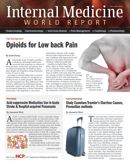Publication
Article
Internal Medicine World Report
Reasons Behind Adherence in Myocardial Infarction Patients
Author(s):
Adherence is more than just a patients' known responsibility to take medications – there are reasons why patients may not want to stick to their regimens, as Lisa Rosenbaum, MD, explored in the latest NEJM.

Lisa Rosenbaum, MD, a national correspondent for The New England Journal of Medicine, discussed her interviews with 20 myocardial infarction patients who are generally opposed to their medications and, thus, do not adhere to their regimens.
Rosenbaum first encountered her friend’s father: a 72 year old man with a zest for life who found himself suddenly worrying about his own mortality after 2 of his sisters died of strokes. He doesn’t take any aspirin, because he doesn’t believe in the medicine. Rosenbaum explained this instinctive non-belief of medications is present in a lot of patients.
The disdain for statins was expressed in a stranger Rosenbaum encountered at a diner while eating with her mother, also a cardiologist. He was opposed because of the potential side effects while taking statins, even though he was prescribed the medication. Many patients in Rosenbaum’s interviews — which took place in person the first time, and once or twice on the phone over the ensuing months – expressed similar views on statins: “Why take medicine that could wreak havoc on his body?” Another reason for not taking specific medications was that, if a medication company has had a law suit against them, or too many side effect disclosures during their commercials or labels, patients would avoid that medication.
In a hair salon, someone commented that medications are a reminder of illness, and since no one wants to be sick, people may simply avoid medications. Rosenbaum acknowledged it’s unnecessary for cardiologists to impose an additional sick identity onto patients, because it may subtly contribute to non-adherence.
Sometimes believing pills are actually vitamins, which are reminders of health, is enough to convince elderly patients to take their medications, as was the case with one patient. “Denial” was a common response of participants when they were asked to identify a reason they were not adhering to their medication regimens.
Another reason patients may discontinue their medications, Rosenbaum explained, was that once patients begin to feel better from the drugs, they may immediately think they’ve fully recovered. Their sense of well being may be enough to convince them that the medications are no longer necessary, especially if they were initially wary of the drugs. Or, some patients feel, that taking a medication indicated inherent failure — like they should be able to control their bodies on their own, which they cannot. Healthy behaviors, while great in themselves, are not an effective substitute for medications, Rosenbaum had to remind patients occasionally.
A 56 year old patient who refuses stress testing and cardiac catheterization has hypertension and hyperlipidemia. His electrocardiogram and echocardiogram suggest he’s had a myocardial infarction, but his response is that he feels fine. “No offense to you, but if it ain’t broke, don’t break it,” he tells Rosenbaum over the phone.
“Although we tend to view non adherence as patients’ failure to know what’s good for them, learning about people’s feelings about medications has made me recognize that my ideas of good and bad were defined solely in my terms,” Rosenbaum concluded. “It’s our job to help patients live as long as possible free of complications of cardiovascular disease.”






